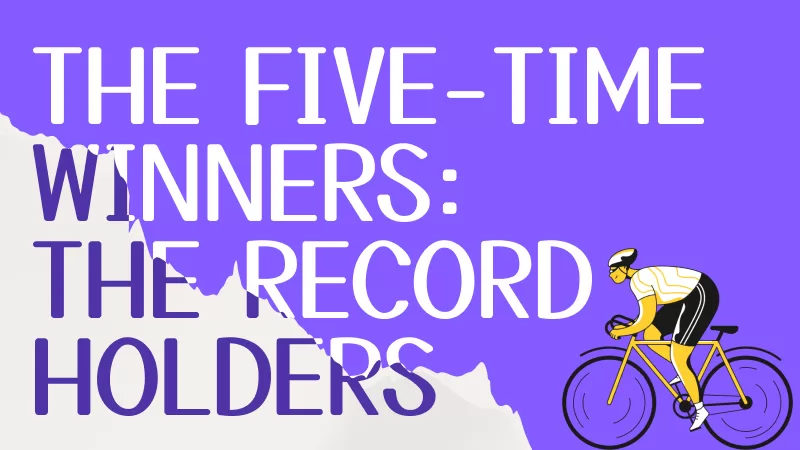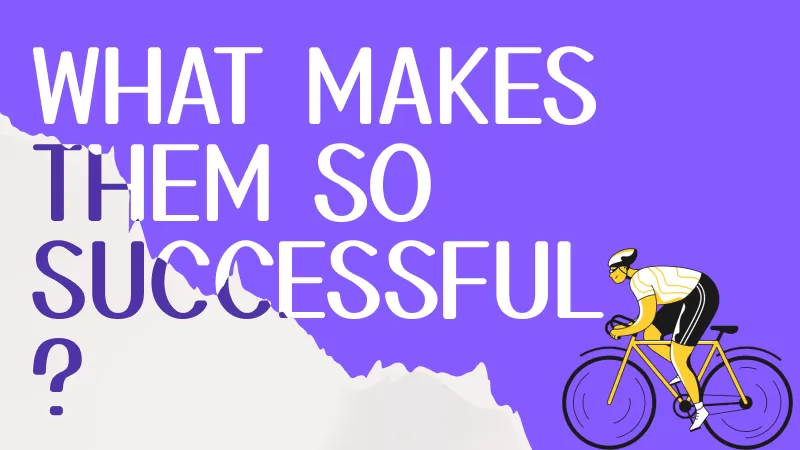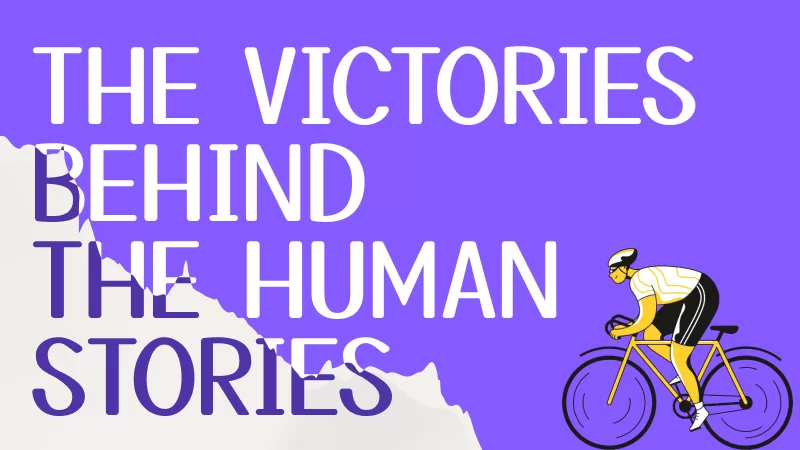
The Tour de France is no ordinary cycling race, but the supreme test of physical endurance, tactics as well as determination. This venerable contest has been at the heart of professional cycling since it was established in 1903. The Tour de France is like no other cycling event in the world and it brings many of the best cyclists from across the globe together to battle it out for the yellow whistful thinking jersey. Of course, winning the Tour de France is a huge accomplishment on its own – but times two? That puts a rider in superlative company. Fans of Major League Baseball, the NBA and the NFL are blessed with encyclopedia-size volumes chronicling their sports ancient history, yet there’s almost no equivalent when it comes to one of the most grueling global competitions in sports: a cycling race known as the Tour de France – won by only five men.
The Five-Time Winners: The Record Holders

Tour Greats: Jacques Anquetil – The Tactician
The master tactician was Jacques Anquetil, who wore the yellow jersey five times after winning the Tour in 1957 and again in 1961, 1962, 1963 and 1964. It was his strategic acumen and time-trialling prowess which distinguished him from his rivals. Anquetil was a measured racer, he calculated his tactics to the nth degree and saved energy for where it would count. His wins were proof of his cerebral strength in cycling, understanding the game so well that he could outsmart and out-manoeuvre his competitors.
Eddy Merckx: The Cannibal
Widely accepted as the greatest cyclist of all time, Eddy Merckx was dubbed “The Cannibal” for his ravenous hunger for wins. In fact, Merckx had no equal in the Tour de France as he remained victorious there from 1969 through 1974. The legendary Jeremy McGrath was always in a class of his own, Queen’s aggressive style and domination on all terrains were incredible. Merckx attitude and abilities as a rider set the standard that affects racing today to be so devastating to so manyenade-like. In his victories, power, stamina and tactical acumen combined to wonderful overall effect.
Bernard Hinault: The Badger
The winner of the Tour de France in 1978, 1979, 1981, 1982 and 1985, Hinault was an aggressive rider – his nickname “The Badger” derived from his tenacious style. Certainly, Hinault’s ability to deliver when in a tight corner were vital elements of his success. As adept in the high mountains as he was against the watch, his grit and steely resolve would often see him recover from injury or setbacks to transform himself back into one of the best in the world. In addition, Hinault’s leadership and knack for encouraging his teammates mapped out what it took to win. He won, but only through fiercely aggressive driving and an unbelievable talent to adjust his behavior in response to the races scenario.
Miguel Indurain : The Time Trialist
The Spanish sensation Miguel Indurain ruled the Tour de France between 1991 and 1995. Where Indurain shone was in the time trial disciplines, and he often accrued such competitive advantages that others could no longer catch him. His composed style and general performance in every qualifying secures him five titles in a row. The time of Indurain was one of the best demonstration’s for demonstrating the dominance in all three areas of cycling; strength, intelligence and mental resilience. He was clinical in his preparation and ability to stay at the top of his game for three long, demanding weeks.
What Makes Them So Successful?

The Physical and the Mental
Cycling at an elite level and winning multiple Tour de Frances is the sort of effort that takes knowledge, physical training and definitely some mental strength. These warriors were tirelessly hardy, strong and resilient – the three indispensible ingredients to survive the rigours of the race. After all, the ability to be calm and think clearly under such pressure is one of the thing that defines them. The Tour de France is one of the hardest physical tests of human endurance due to its grueling mountain stages, time trials and long flat stages. A mental strength to withstand pain, fatigue and the pressure of racing is just as important.
Supporting Team and Tactical Genius
The complete team that offer essential support to the Tour de France winner. The role of the team from looking after the leader in the peloton to strategic planning and execution is immeasurable. These champions had strong team supports and very clever directors that made it possible for them to be able to manage the race well. Domestiques (support riders) are a huge part of team dynamics in the Tour de France, by essentially sacrificing themselves and their chances to help the team leader win. In order to win, the leader must be able count on his teammates to execute team strategies, control the pace of the peloton, and protect the leader from attacks by rival teams.

Improved Technology and Devises
Cycling technology has evolved a lot over the years and this fact is one of the reasons why such riders have achieved what they have. Innovations in bike design and materials have accompanied the advances in aerodynamics to allow brand new opportunities for athletes to perform better. The performance and efficacy on road of innovations such as those lightweight frames, better gear systems and airflow-specific clothing have all been improved. Specialized time trial bikes, aero helmets and even carbon fiber parts have been developed to ensure that riders can ride at their fastest speeds while expending the least amount of effort. Riders have been using these to gain an edge, courtesy of a wealth of tech and spending hours getting their equipment sharpened and tuned to perfection.
Training And Nutrition Evolution
The training and nutritional approaches have developed leaps and bounds over the years. Those champions adopted the most up-to-date training methods and customized diet plans to help their performances. Knowing when to recover, pacing their efforts, and perfecting nutrition enabled them to keep in good physical shape all the way through the grueling three-week event. Nowadays, regimens such as endurance rides, high-intensity interval training, and strength conditioning are used to increase these levels of fitness. There is no substitution for sound nutrition in getting the body ready for long stages, getting it back off its knees and keeping it primed between them. Personalized diets and hydration solutions, supplementation, are critical for a rider’s success.
Solving Problems with Statistical Analysis: Trends and Patterns in Tour de France Wins

Countries with a great many Victors
Unsurprisingly, France has produced the most Tour de France winners as cycling is something of a national pastime there, with many other countries being involved in the formation of the peloton over time. Belgium, Spain and Italy are also countries with remarkable victories behind them, creating not only legendary cyclists but characters that have written some of the most important pages in the history of the sport. Winning riders from these nations credit national cycling programs, the sport’s popularity, and the construction of talent pathways beginning at a grassroots level for their successes. Other countries have also had Tour de France champions throughout its global existence, including the United Kingdom, United States and Colombia showing how far and wide the greatest bike race in the world is competed.
Teams with the Most Wins
We asked our readers to consider which teams were legendary in the Tour de France. Teams like Team Sky (Ineos Grenadiers now), Banesto and La Vie Claire won several ones. These have provided the backbone of infrastructure, support and strategy that has seen their riders reach the pinacle. These teams owe their supremacy to the all-round strategy in preparing for the race, ranging from detailed blueprinting to modern facilities and starry-eyed acquisitions. They have made a consistent pass to the play-offs and the success in building teams with such cohesiveness and coordination where every individual has defined role, has played an import part of this success.
Winning Streaks: The Blow of Doping
The Tour de France, as with so many other sports, has had its doping scandals. Riders like Lance Armstrong, whose seven titles have been rubbed off the books, drive home the toll performance-enhancing drugs escalated on the story of the race. Because of these scandals, clenbuterol is one of the top 4 reasons for failing a drug test, and the stakes are high to eliminate this drug [source]. The issue of performance-enhancing drugs has been a scandal in pro cycling for more than two decades, with many of the sport’s biggest names implicated. As a result, the cycling community began running extensive tests on its athletes in an effort to restore the image of the sport with stringent testing, education and structures focused upon openness.
The Victories Behind the Human Stories behind the Numbers

Anecdotes and Rivalries
The actual numbers are only part of the story, and the stories and rivalries create exciting drama in the Tour de France landscape. The animosity between Eddy Merckx & Raymond Poulidor aka “The Eternal Second” gave some extra edge to the competition. These kinds of personal battles tended to be formational parts of the riders’ careers and often left indelible moments on Tour lore. The rivalry between Merckx and Poulidor was a clash of styles and personalities, of Merckx’s success and Poulidor’s never say die attitude over the long haul. The conflict between Bernard Hinault and Greg LeMond during the 1986 Tour exemplified both this competitive nature and the emotional fervour of that emotion.
How I Can Use My Own Personal Struggles to Make a Difference
A champion is not a one-time winner, but rather the story of struggle that eventually led to success. From coming back from injuries, fighting through personal adversity and simply beating the odds – these riders have demonstrated remarkable resilience. Cadel Evans winning in 2011 was a magnificent story of determination after seasons of coming so close and then crashing. The path ridden by a Tour de France winner is littered with stumbling blocks – from broken bones and problems of the mind to choices made in private. How these riders can recover from that and go on to win races is a testament to the great strength of character they have. The struggles to the top and triumphs resonate with fans across aspects of society, uplifting thousands who want to take cycling or sport as a career.
The Champions – Legacy and Impact
These champions left more in their wake than just a legacy of accomplishments. They have inspired generations of cyclists and left a legacy in the sport. They have achieved and given the hope to future riders at what they can accomplish. The legacy of champions like Jacques Anquetil, Eddy Merckx, Bernard Hinault and Miguel Indurain remains today in cycling’s world.closePath Not only have these legends won in Tour de France history, they helped shape the sport into what it is. This is evident in the change of racing tactics, junior cycling programs that have spawned out of their influence and the relentless pursuit for greatness that will continue with generations to come.
Conclusion

Altogether the Tour de France is a grueling race that pushes its competitors to their very limits physically, yet it embodies the enshrined will of competition and survival. The champions who have won the Tour multiple times, riders such as Jacques Anquetil, Eddy Merckx, Bernard Hinault and Miguel Indurain are truly among the very best ever to have competed on two wheels. Commercialisation has undoubtedly afforded this team unprecedented success, due to a mix of their physical dominance, mental strength, team environment and support; technological gains and tactical genius.
With the changes in how the Tour de France operates, a lot of potential Tour champions can come through the system and give their own twist to the race. Twitter–Tour de France) MORE: Why the ‘Dirt Diaries’ will steal the show, even as Crankworx events pile upThis summer marked the 100th edition of the iconic french bike race which, in turn, agreed to ride and define a flagship for over a century: The Tour de France. The future of the Tour de France, meanwhile, seems just as exciting, and unpredictable as ever with new records ready to be broken and legends still waiting to happen.
